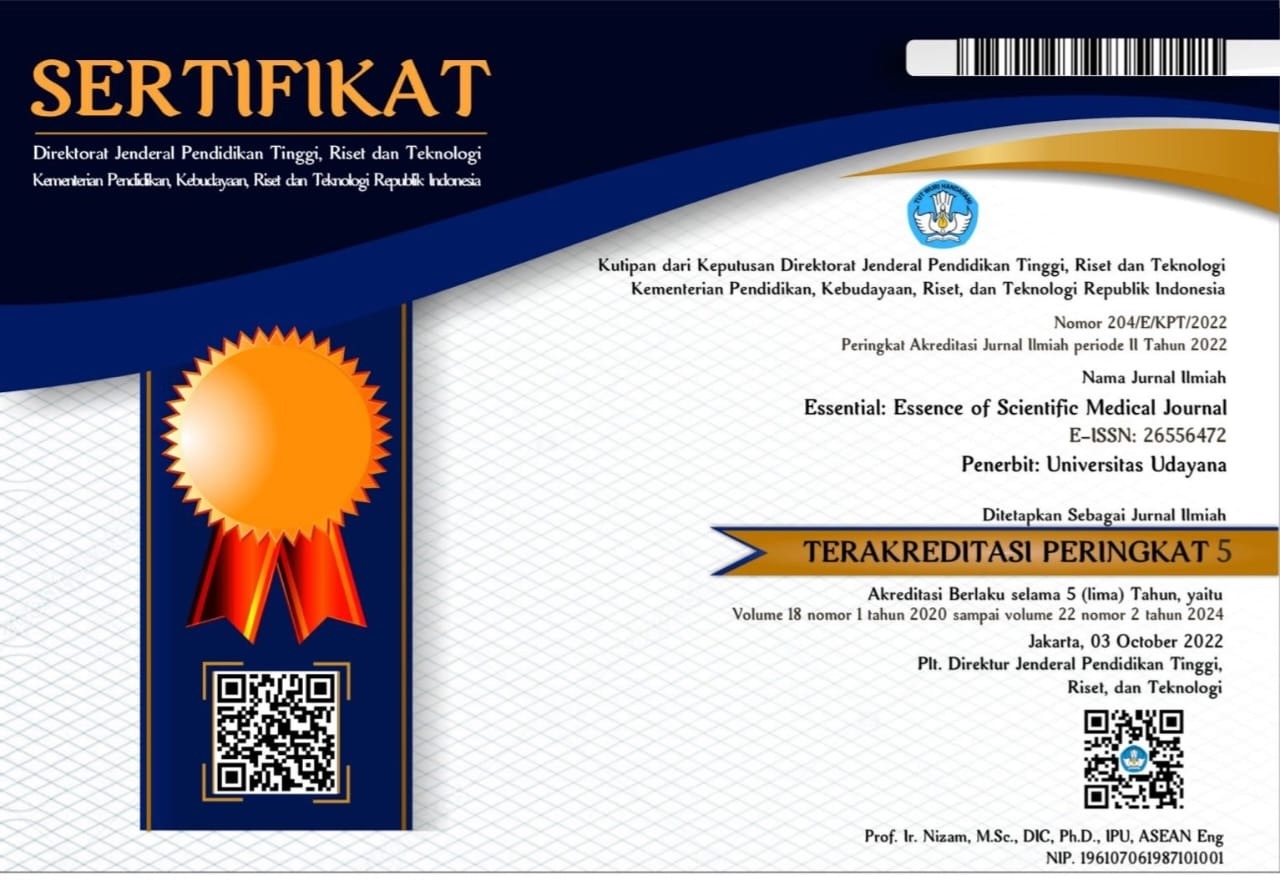EFEKTIVITAS PENERAPAN MINDFULNESS-BASED COGNITIVE THERAPY (MBCT) PADA INDIVIDU DENGAN OBSESSIVE COMPULSIVE DISORDER (OCD)
Abstract
Introduction: Obsessive Compulsive Disorder (OCD) is a psychological health disorder that occurs when individuals have excessive anxiety or fear with obsessive thoughts and compulsive behaviors that interfere with activities that will develop into a severe chronic mental disorder. The most widely used intervention today is CBT, however, there are some drawbacks such as the possibility of relapse and lack of long-term effects. Mindfulness-based cognitive therapy (MBCT) is an intervention that trains skills in individuals with openness, awareness without judgment and acceptance of experience in the present moment. MBCT has been proven effective in overcoming symptoms of anxiety and depression. This study aims to determine the effectiveness of MBCT implementation in individuals with OCD.
Discussion: The results showed that MBCT was effective in reducing symptoms of OCD symptoms. MBCT was also shown to significantly reduce anxiety and depression in individuals with OCD. MBCT is an acceptable and safe therapy for individuals with OCD. This therapy is also effective as a follow-up therapy to CBT and can be used as the main therapy for individuals with OCD.
Conclusion: Mindfulness-based cognitive therapy (MBCT) is quite effective in reducing symptoms and improving skills in individuals with obsessive compulsive disorder (OCD). The intervention was generally acceptable to individuals with OCD as it increased mindfulness. It can be used as a follow-up therapy to reduce residual symptoms from cognitive behavior therapy (CBT) or as an effective primary therapy.
Downloads
References
2. Stein DJ, Costa DLC, Lochner C, Miguel EC, Reddy YCJ, Shavitt RG, et al. Obsessive–compulsive disorder. Nat Rev Dis Primers. 2019 Aug 1;5(1):1–21.
3. Brock H, Rizvi A, Hany M. Obsessive-Compulsive disorder. StatPearls Publishing. 2023.
4. American Psychiatric Association. Diagnostic and Statistical Manual of Mental Disorders. American Psychiatric Association; 2013.
5. Agung MA. Gangguan kecemasan OCD: Penyebab dan faktor resiko pada remaja. Maliki Interdisciplinary Journal. 2023 Jan;1(4):154–7.
6. Salamah SN, Muammaroh NLR. Pengendalian Diri Pada Penderita OCD. Psikodinamika - Jurnal Literasi Psikologi. 2021 Apr 20;1(1):41–56.
7. Chacon P, Bernardes E, Faggian L, Batistuzzo M, Moriyama T, Miguel EC, et al. Obsessive-compulsive symptoms in children with first degree relatives diagnosed with obsessive-compulsive disorder. Revista Brasileira de Psiquiatria. 2018 Jun 11;40(4):388–93.
8. van Grootheest DS, Cath DC, Beekman AT, Boomsma DI. Twin Studies on Obsessive–Compulsive Disorder: A Review. Twin Research and Human Genetics. 2005 Oct 1;8(5):450–8.
9. Marsden Z, Lovell K, Blore D, Ali S, Delgadillo J. A randomized controlled trial comparing EMDR and CBT for obsessive–compulsive disorder. Clin Psychol Psychother. 2018 Jan 28;25(1).
10. Gragnani A, Zaccari V, Femia G, Pellegrini V, Tenore K, Fadda S, et al. Cognitive–Behavioral Treatment of Obsessive–Compulsive Disorder: The Results of a Naturalistic Outcomes Study. J Clin Med. 2022 May 13;11(10):2762.
11. Bonchek A. What’s Broken with Cognitive Behavior Therapy Treatment of Obsessive–Compulsive Disorder and How to Fix It. Am J Psychother. 2009 Jan;63(1):69–86.
12. Hiss H, Foa EB, Kozak MJ. Relapse prevention program for treatment of obsessive-compulsive disorder. J Consult Clin Psychol. 1994;62(4):801–8.
13. Springer KS, Levy HC, Tolin DF. Remission in CBT for adult anxiety disorders: A meta-analysis. Clin Psychol Rev. 2018 Apr;61:1–8.
14. Segal Z V., Williams JMG, Teasdale JD. Mindfulness-based cognitive therapy for depression: A new approach to preventing relapse. New York: Guilford; 2002.
15. Williams JMG, Teasdale JD, Segal Z V., Kabat-Zinn J. The mindful way through depression: Freeing yourself from chronic unhappiness. New York: Guilford; 2007.
16. Nugroho ARBP, Halwati U. Konseling dan Mindfulness Based Cognitive Theraphy (MBCT): Treatment bagi Pasien Kanker. Assertive: Islamic Counseling Journal. 2022 Jun 3;1(1):26–45.
17. Khazami M, Dasht Bozorgi Z. Effectiveness of the Mindfulness-Based Cognitive Therapy on Depression, Stress, and Anxiety Among COVID-19 Patients. Jundishapur Journal of Health Sciences. 2021 Aug 24;13(3).
18. Raee M, Fatahi N, Homayoun MS, Ezatabadipor H, Shams M. The effect of Mindfulness-Based Cognitive Therapy (MBCT) on self-esteem, self-concept, and social anxiety of people with social anxiety disorder. ASEAN Journal of Psychiatry. 2022 May;23(05).
19. Kocovski N, MacKenzie M. Mindfulness-based cognitive therapy for depression: trends and developments. Psychol Res Behav Manag. 2016 May;125.
20. Prameswari A, Yudiarso A. Efektivitas Mindfulness-Based Cognitive Therapy untuk Menurunkan Depresi : Meta-Analisis. Psycho Idea. 2021 Aug 7;19(2):151.
21. Cludius B, Landmann S, Rose N, Heidenreich T, Hottenrott B, Schröder J, et al. Long-term effects of mindfulness-based cognitive therapy in patients with obsessive-compulsive disorder and residual symptoms after cognitive behavioral therapy: Twelve-month follow-up of a randomized controlled trial. Psychiatry Res. 2020 Sep;291:113119.
22. Segal Z V., Williams JMG, Teasdale JD. Mindfulness-based cognitive therapy for depression (Second ed.). New York: The Guilford Press.; 2013.
23. Leeuwerik T, Cavanagh K, Forrester E, Hoadley C, Jones AM, Lea L, et al. Participant perspectives on the acceptability and effectiveness of mindfulness-based cognitive behaviour therapy approaches for obsessive compulsive disorder. PLoS One. 2020 Oct 21;15(10):e0238845.
24. Selchen S, Hawley LL, Regev R, Richter P, Rector NA. Mindfulness-Based Cognitive Therapy for OCD: Stand-Alone and Post-CBT Augmentation Approaches. Int J Cogn Ther. 2018 Mar 3;11(1):58–79.
25. Key BL, Rowa K, Bieling P, McCabe R, Pawluk EJ. Mindfulness‐based cognitive therapy as an augmentation treatment for obsessive–compulsive disorder. Clin Psychol Psychother. 2017 Sep 13;24(5):1109–20.
26. Mathur S, Sharma MP, Balachander S, Kandavel T, Reddy YJ. A randomized controlled trial of mindfulness-based cognitive therapy vs stress management training for obsessive-compulsive disorder. J Affect Disord. 2021 Mar;282:58–68.
27. Pundeer A, Jahan M. Application of mindfulness-based cognitive therapy module on symptoms severity in patients with obsessive compulsive disorder. IAHRW International Journal of Social Sciences. 2019;7(5):1122–6.
28. Musa ZA, Kim Lam S, Binti Mamat @ Mukhtar F, Kwong Yan S, Tajudeen Olalekan O, Kim Geok S. Effectiveness of mindfulness-based cognitive therapy on the management of depressive disorder: Systematic review. Int J Afr Nurs Sci. 2020;12:100200.
29. Külz AK, Landmann S, Cludius B, Rose N, Heidenreich T, Jelinek L, et al. Mindfulness-based cognitive therapy (MBCT) in patients with obsessive–compulsive disorder (OCD) and residual symptoms after cognitive behavioral therapy (CBT): a randomized controlled trial. Eur Arch Psychiatry Clin Neurosci. 2019 Mar 16;269(2):223–33.
30. DIDONNA F, LANFREDI M, XODO E, FERRARI C, ROSSI R, PEDRINI L. Mindfulness-based Cognitive Therapy for Obsessive-Compulsive Disorder: A Pilot Study. J Psychiatr Pract. 2019 Mar;25(2):156–70.
31. Zhang T, Lu L, Didonna F, Wang Z, Zhang H, Fan Q. Mindfulness-Based Cognitive Therapy for Unmedicated Obsessive-Compulsive Disorder: A Randomized Controlled Trial With 6-Month Follow-Up. Front Psychiatry. 2021 Aug 3;12.


 SUBMISSION
SUBMISSION
















